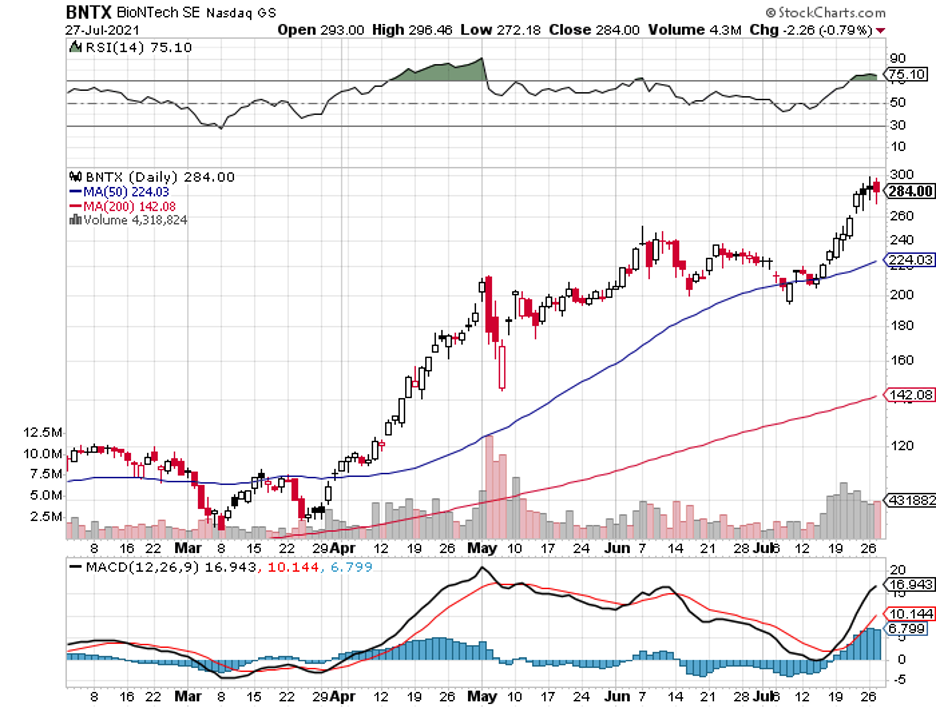A Biotech Prepared for Another Doomsday Market
If you’ve heard of Harry Dent Jr., then you know that he’s the economist who correctly and accurately forecasted the Japanese economic downturn back in 1989. He also hit the nail on the head when he predicted the collapse of the dot.com bubble in 2000.
Now, he’s saying that the stock market will crash in the next three months, describing it as “the biggest crash of our lifetime.”
There’s no precise method to determine if his pessimistic outlook is justified thus far.
Nonetheless, even if Dent turns out to be right, I don’t believe that all stocks will plummet. There are a handful of stocks that could soar if the stock market does crash this summer.
For instance, I think vaccine stocks would most likely take off if the new variants of COVID-19 triggered a market crash in the coming months.
After all, the best weapons we have in overcoming these issues are still vaccines.
I also think that one of the biggest—if not the biggest—winners in this segment is BioNTech (BNTX).
Let me share with you the reasons.
For one, BioNTech is actually the smallest of the biopharmaceutical companies in the vaccine market today.
Catalysts typically generate larger swings in stocks that hold smaller market capitalizations compared to those with bigger market caps.
It’s also telling that BioNTech and its co-vaccine developer, Pfizer (PFE), have started delving into tactics to handle the continuous rise of the Delta variant.
So far, what the partners have suggested includes adding a third dose to the COVID-19 vaccine to boost the immunity and protection of people against the new strain.
The two are also looking into beginning their clinical testing on a modified version of their vaccine, which would specifically target the Delta variant, by August.
BioNTech’s valuation also plays a key role. The company so far is the cheapest among the leading vaccine stocks, which include Moderna (MRNA) and AstraZeneca (AZN), based on its forward earnings multiples.
To date, BioNTech trades at roughly 6.3 times its expected earnings—a low valuation that wouldn’t last long, especially if fears about the new variants spark another massive downturn in the market.
Thus far, BioNTech and Pfizer have delivered roughly 392 million vaccine doses to the US alone.
However, the country is anticipating increasing demand for it, pushing it to sign up for an additional 200 million doses.
The duo plans to deliver 110 million doses to the US by the end of 2021 and the rest of the orders by April 2022.
In a separate agreement, the US also ordered 500 million doses as donations to developing countries across the globe.
In comparison, Moderna delivered 137.3 million, while Johnson and Johnson (JNJ) supplied 13.1 million.
On top of these, Pfizer and BioNTech are working to expand the reach of their vaccine.
The companies recently sealed an agreement with Biovac, a company in South Africa, to produce vaccine shots from a plant in Cape Town. Similar initiatives are under exploration in Latin America.
Riding the momentum of its COVID-19 vaccine, BioNTech is also working to develop a highly effective and widely tolerated malaria vaccine.
The malaria vaccine candidate is expected to build on two decades’ worth of mRNA research, which BioNTech used to co-develop the COVID-19 vaccine with Pfizer.
The clinical trial for this new project is planned to start by the end of 2022.
At this point, only one malaria vaccine is available on the market: GlaxoSmithKline’s (GSK) Mosquirix, which offers about 30% effectiveness in safeguarding kids from the mosquito-borne virus.
If successful, BioNTech will be easing a massive burden globally, as over 400,000 children die from malaria every year.
In addition to its malaria vaccine candidate, BioNTech is also looking into using its mRNA expertise to diversify its pipeline to include cancer treatments, including colorectal cancer, advanced melanoma, and other malignant solid tumors.
BioNTech’s move to attempt to conquer the oncology sector gained even more traction following its recent acquisition of Kite, a manufacturing plant under Gilead Sciences (GILD).
Kite primarily focuses on an experimental kind of cancer treatment relating to neoantigen T-cell receptor cell therapy.
In the first quarter of 2021, BioNTech was able to boost its sales by over 7,295%.
Its total revenues within that period reached $2.49 billion, which indicates a healthier revenue stream compared to its main competitor, Moderna, which raked in $1.9 billion.
In terms of sales outlook for the entire year, BioNTech also forges ahead with $26 billion, while Moderna anticipates $19.2 billion.
Needless to say, these numbers show how undervalued BioNTech has been lately.
Given the new developments concerning the new variants and the company’s expanded coverage of the market, it’s clear to see that the future looks bright for BioNTech regardless of Dent’s doomsday market predictions.

